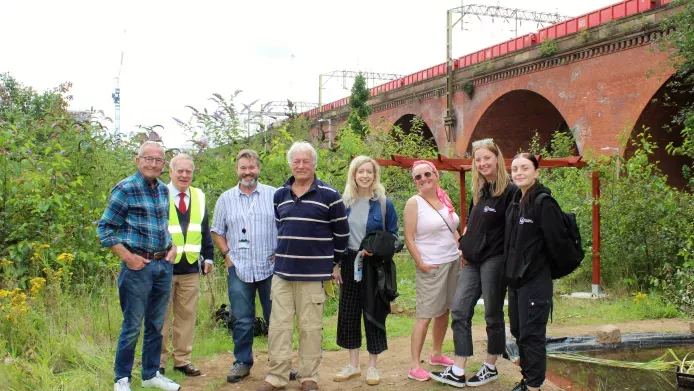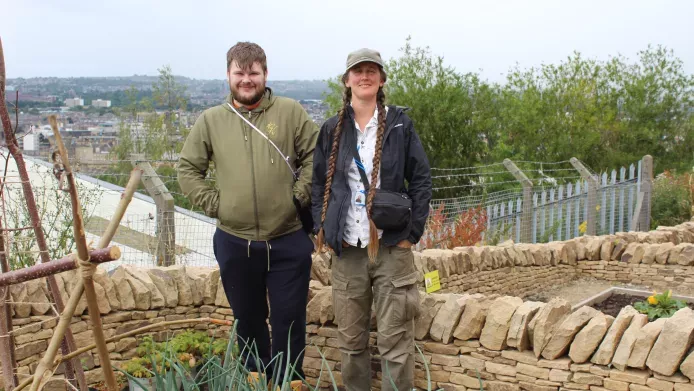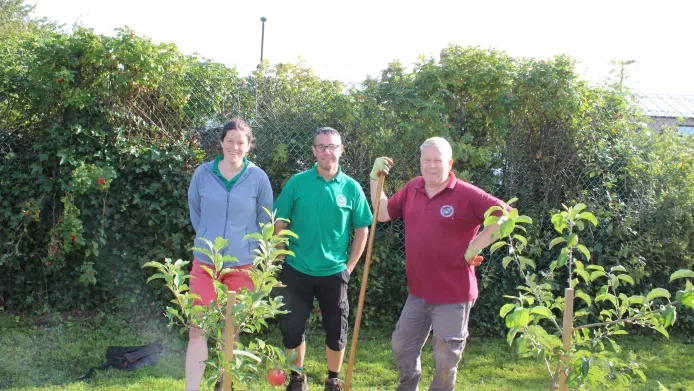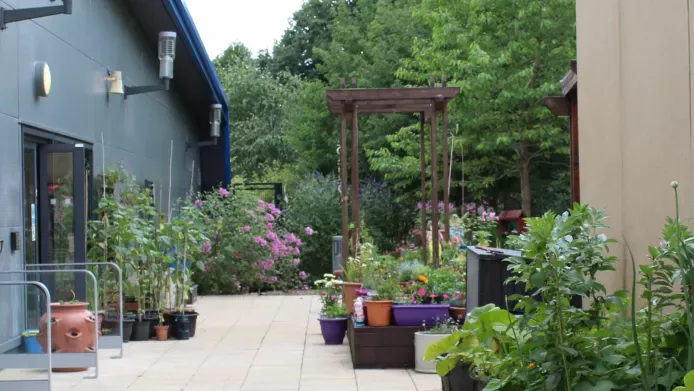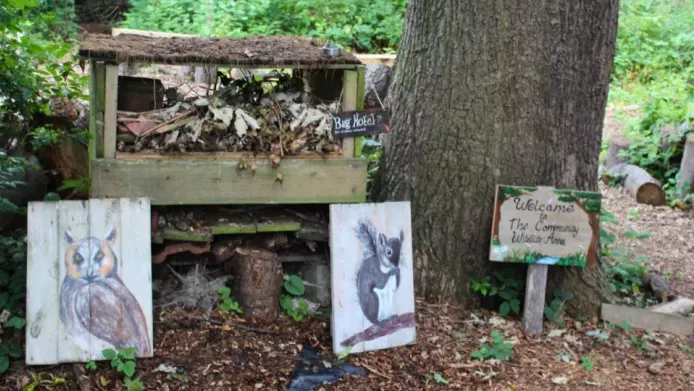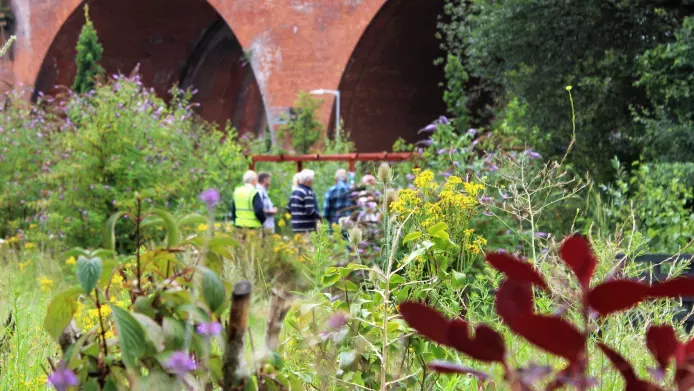We have funded and supported a wide range of amazing community projects from across the UK over the years.
Our Community Programme offers grants to community, youth or voluntary groups to carry out a project idea to connect local people with the natural world and transform urban spaces with UK native plants.
If your group is feeling inspired to join our Community Programme, visit our Community Grants page for everything you need to know about eligibility and how to apply.
"We have really felt supported by Grow Wild, it’s a motivator and the training sessions really spurred people on." - Incredible Edible Garforth, 2022
Previous Community Projects
Examples of community projects funded and supported by Grow Wild.
The Hanging Gardens, Llanidloes
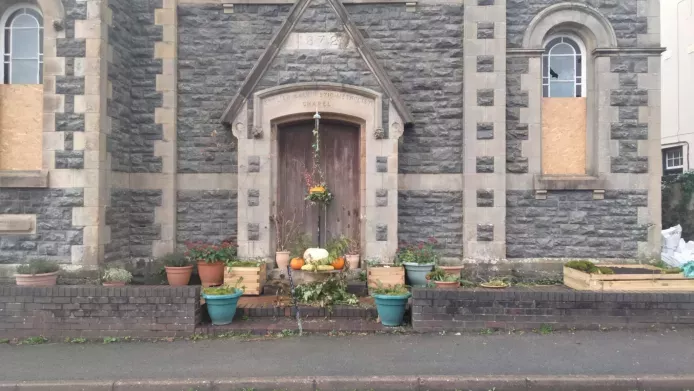
The Hanging Gardens is a thriving community hub in the centre of Llanidloes, utilising converted chapel buildings. The group focuses on building resilience and upskilling people in the local community and used the grant to begin transforming their outdoor space through creation of native apothecary beds and potted woodland gardens.
Artwork and information boards were created by volunteers and community groups. The project has led to engagement with new members of the community and strengthened connections with local wildlife groups including Montgomeryshire Wildlife Trust. There are exciting plans for the future to expand the woodland garden and create a wildlife pond.
Visit our blog to hear about the project from the project leaders
Incredible Edible Garforth

Incredible Edible adopted a large, neglected space behind some houses in a residential area of Garforth.
The group used their grant to improve accessibility to the space, making it more usable for the local community, whilst maintaining and enhancing the site as a haven for wildlife. To increase biodiversity on the site, the group built a pond, sowed UK native flowers and planted a UK native hedgerow. They also connected with a local group to support the release of rescued hedgehogs at the site.
The group run regular volunteering sessions where people from the local community turn up and help with whatever jobs need doing. They hope to encourage more people to visit the site and get involved in future, and plan to add informative signage, a bench and bird hide.
Read more about the project on our blog.
Conquer Life, Bootle
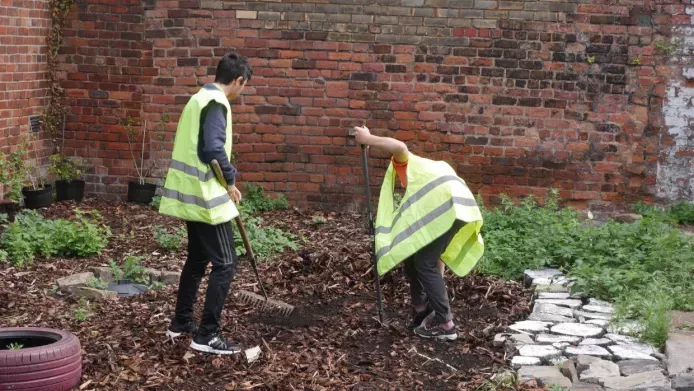
Vibe at Conquer Life provides free activities, early intervention projects and open access events for young people aged 8-18. After discovering that local young people were interested in gardening, Conquer Life applied for a Grow Wild grant to transform their garden (previously a fly-tipping hotspot).
They created a wonderful space to grow plants, educate and bring the local community together. Most of the families and young people who access programmes offered by Conquer Life don’t have a garden, many have English as an additional language, and some have very limited prior experience of growing plants and eating fresh vegetables.
Conquer Life have since been inspired to build an early intervention project surrounding food and are planting borders of UK native wildflowers.
Read the full case study on our blog.
Hollybush Estate Tenants and Residents Association (HETRA), Cardiff
HETRA started their project to encourage young residents living on the Hollybush Estate to learn about nature through gardening, empowering them to take ownership of their outdoor space.
The group used their Grow Wild grant to begin transforming a mown grass space, with the aim of enhancing biodiversity and engaging local children to get involved, building their knowledge and appreciation of nature.
The group delivered a week-long nature club for children during the summer holidays, sowed new wildflower areas, ran an artist-led willow sculpture making workshop, and many more activities including bug hunts, natural dye making and food and cooking activities using produce grown.
Following the planting of new wildflower areas, they have seen a massive increase in bees and butterflies. Project leaders have also noticed positive changes in local residents since the project began, becoming a more confident, communicative, happier community with a greater sense of pride in where they live.
Read the full story on our blog.
Good Things Collective, Morecambe
 Board created and photographed by Molly Brand, Good Things Collective
Board created and photographed by Molly Brand, Good Things Collective
Learning from the positive impact gardens had on experiences of lockdown, Good Things Collective developed a micro garden in residential Morecambe, where homes often lack outdoor space.
After creating a communally managed garden, they hosted educational activities teaching the benefits of native planting and local flora. In addition to this they led nature-based arts and crafts workshops such as cyanotype printing, and plant sketching sessions.
The project has helped build social connections amongst participants, including some individuals who previously felt isolated and disconnected from the local community.
The group has significantly enhanced the diversity of plant life on the site and have enjoyed seeing more caterpillars, butterflies and bees.
To discover the full story, visit the Grow Wild blog.
Friends of Kelly Avenue Park, London
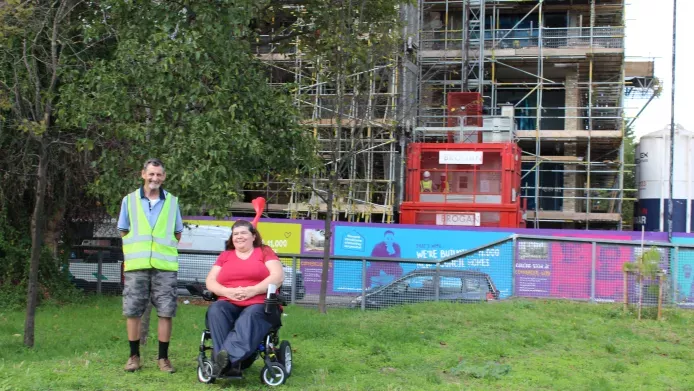
The Friends of Kelly Avenue Park in Peckham are a volunteer group working to enhance their local park and run community activities. The park is located in a busy urban area and well used by local families, many of whom don’t have their own gardens.
The group worked hard to add plant diversity to the site, including extensive UK native wildflower planting around the children's slide, planting new fruit bushes and creating a living willow shelter. They also ran nature themed workshops with local children during the summer, engaging with families using the park.
The group is continuing their work and plan to host more nature focused workshops with local school groups and create educational boards about plants and wildlife within the park, supporting community learning.
Visit our blog to read the full story.
United to Assist Refugees UK, Wrexham
UAREUK is a charity working to support refugees and asylum seekers in Wrexham and North Wales. Project leaders engaged a group of refugee volunteers to adopt and transform an abandoned allotment site into Broom Grove Community Garden. The project aimed to empower the volunteers to develop greater confidence, self-worth and community connections.
The site was unloved and challenging to work with – large unmaintained allotment beds sitting on a concrete base. The group has re-established the space as a place for people to grow and connect with nature and each other. Biodiversity has been supported through creation of a pond, bee bank, wildflower meadow, UK native hedge, micro forest and bug hotels.
The group has also purchased vital gardening tools and equipment to enable the project to continue and plan to encourage other local groups to use the garden, such as those working with young families.
Visit our blog to find out more about the project.
Buxton School
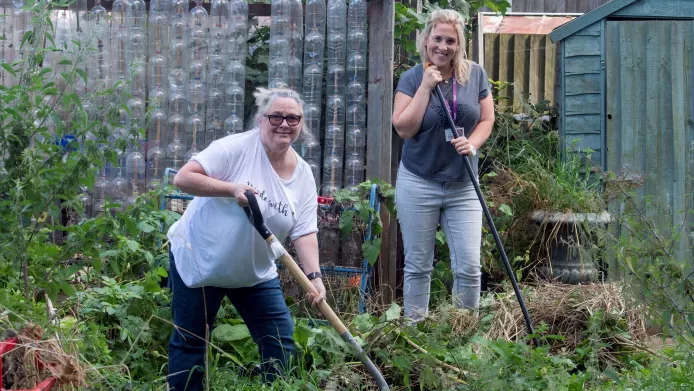
Buxton School is an all-through school in Leytonstone, London educating pupils aged 3 to16.
The school acquired an old allotment site from the council to develop into a much-needed green space for pupils to learn about the environment, conservation, gardening, science and to experience the natural world.
The school is keen to establish the space as an outdoor classroom, while retaining wild areas and working with the pupils to enhance its biodiversity.
Transplanted, Scotland
Transplanted began in 2014, inspired by the works of John Oswald. He was a baroque composer who wrote ‘Airs for the Seasons’; a remarkable compendium of 96 duos for violin and cello, each depicting a different plant or flower.
Sonia Cromarty (cello) and Alice Rickards (violin) commissioned eight new works by Scottish composers, asking each to write a piece about a plant, lichen or fungi native to Scotland.
The pair used their Grow Wild community project funding to take Transplanted to four secondary schools in urban areas of Scotland, connecting each participating school to a local green space in their community. The school pupils were given a tour, learning about the things that grow in the space and the conservation work being carried out. Each day ended with a short performance of the new works with pieces taking inspiration from the history, uses, lifecycles, colours and smells of plants, wildflowers and fungi.
'The tour of a local green space allowed for hands-on learning and we hope has created a connection between participants and the green space in their community which can be visited all year round.'
Keen to connect more deeply with nature? Read about how to use your senses to appreciate wild plants.
Idle Women, Lancashire

Idle Women, started by Rachel and her partner Sis in 2015, was originally based in a touring narrowboat which travelled Lancashire's canals, inviting women to come on board and take part in artist-led creative workshops.
Eventually, with the help of crowdfunding, they purchased a garden along the canal and took up permanent residence there, aiming to turn it into a 'medicinal physic garden dedicated to the health and wellbeing of women'.
In 2019, with Grow Wild community project funding, they embarked on a project called 'From Mud to Medicine', running workshops and events over the course of several months and observing the changes to the landscape and themselves.
They used what they learned during the project to help them in the next phases of the project – the garden is now in the process of being landscaped. When completed, the Physic Garden will provide women with a garden to visit and a study base for medicinal plants and women’s health.
Visit the Idle Women website.
Denmark Hill Community Garden, South London
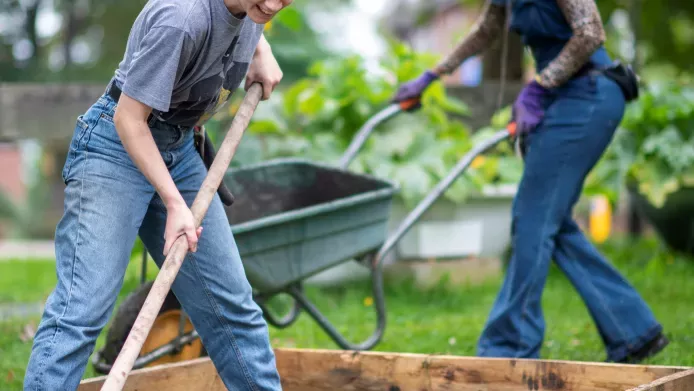
A grassroots, resident-led community garden for all, aiming to connect residents of the Denmark Hill Estate in South London through growing and creative workshops.
Residents came together during lockdown and started making use of planting beds within their estate, creating a place for people to meet safely outdoors and grow.
With their grant the group now has plans to expand the garden, adding new beds and a greenhouse.
Greening Church Street, Stoke-on-Trent

Greening Church Street used their community project grant to brighten up a grey concrete space and bring nature into the town.
The team explained that their area of Stoke is built around terraced housing and shops with very little outdoor space. Many buildings open straight onto the street, so the green space needed to be small and low-cost to attract interest – their biggest installation was a bike garden measuring 2x1 metres.
With additional support in the form of free soil from a local business, they used recycled materials to create colourful art installations and upcycled planters which they filled with UK native wildflowers. Workshops such as making plant pots from tin cans involved the local community, and bike and bath gardens created visual interest.
The team identified social media as a big boost for them – the project reached new audiences who might not have otherwise been involved. There is power in the imagery of projects happening, so capture photos and stories where you can!
Cody Wilds, East London

Grow Wild funding helped the Gasworks Dock Partnership transform Cody Dock on the River Lea in East London into Cody Wilds, a kilometre-long public riverside path that acts as a vital green corridor for wildlife.
The team saved and replanted ancient reed beds, helping other plants to flourish and creating crucial habitats for birds, pollinators and other riverside creatures.
Over 6,000 people have volunteered at Cody Dock over the years and more than 50,000 visitors have stopped by, among them myriad groups of inner-city schoolchildren who take part in explorations of scientific discovery along the riverbank. The project allows them an all too rare opportunity to connect with nature.
Would you like to connect more with the natural world? Nature journaling could be for you.













